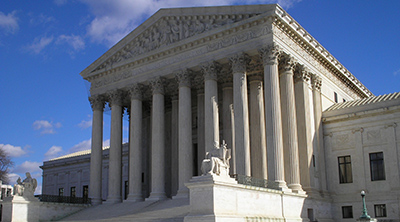
In Amici Brief to SCOTUS, MBA, Trade Groups Stress Importance of Mortgage Market Stability

The Mortgage Bankers Association, the National Association of Home Builders and the National Association of Realtors on Monday filed an amici brief with the U.S. Supreme Court in Consumer Financial Protection Bureau v. Community Financial Services Association of America.
While the brief takes no position on whether the Bureau is constitutionally funded, it urges the Court to avoid ruling in a manner that would disrupt the housing and mortgage markets, harming both consumers and the economy.
The brief said the real estate finance industry and consumers would be impacted greatly by a Court ruling that questions existing Bureau rules regarding mortgages, which the industry has implemented and complied with for more than 10 years. “The significant legal uncertainty and prospects for a wave of litigation brought on by consumers, government agencies and other industry participants would be catastrophic to the housing market and detrimental to all mortgage borrowers,” it said.
While the MBA/trade group amici brief focuses solely on how the ruling could impact the housing and mortgage markets, the case has enormous broader implications. The central argument focuses on whether the CFPB’s funding structure is constitutional, with CFSAA arguing that the way Congress chose to fund the Bureau violates the Appropriations Clause of the U.S. Constitution, which says “no money shall be drawn from the Treasury, but in consequence of appropriations made by law.” Specifically, CFSAA argued that a CFPB rule on payday lending was illegal because of the Bureau’s funding structure.
In October, the U.S. Court of Appeals for the Fifth Circuit in New Orleans agreed with CFSAA. In a unanimous decision, the Appeals Court said the Bureau’s funding mechanism was unconstitutional—calling into question virtually every ruling the Bureau has made since its inception in 2010. The Bureau promptly appealed the decision to the Supreme Court, which agreed to hear the case.
The MBA/trade groups’ brief stresses that if the Court strikes down the Payday Lending Rule in this case and does so in a broad manner that draws into question all the Bureau’s rules, it should take steps to limit the scope of the ruling. They highlight that the Court recognized in Seila Law LLC v. CFPB that undoing the Bureau’s actions across the board would do “appreciable damage to Congress’s work in the consumer finance arena” and warn in the brief that the same threat applies today.
“If the Court concludes that any part of the Bureau’s funding statute violates the Appropriations Clause, it should conduct a severability analysis and excise the offending portions, making clear that its ruling does not call into question the validity of any existing CFPB regulations not challenged in this case,” the groups said. “Granting ‘de facto validity’ to the CFPB’s past acts and temporarily staying the judgment to give Congress time to fix the agency’s funding structure is warranted to avoid sowing chaos in an economy already under strain.”
The Bureau’s appeal of the Fifth Circuit Court of Appeals decision in CFSA v. CFPB will be heard by the Court during its next term, beginning on Oct. 1.
